The BEST episodes of America's Test Kitchen season 7
Every episode of America's Test Kitchen season 7, ranked from best to worst by thousands of votes from fans of the show. The best episodes of America's Test Kitchen season 7!
In "America's Test Kitchen From Cook's Illustrated," a team of expert chefs continue to provide viewers with practical recipes and recommendations that they can use to save money, time and effort in the kitchen. With its uniquely scientific flavor, the show uses blind tasting judges, flash animations and laboratory procedures to answer a variety of kitchen questions. Putting everything from pasta and pasta pots, cheese and cheese graters, as well as host Chris Kimball to the test, this series offers surprises that often defy price points and move beyond fancy packaging and brand expectations.

#1 - Staying in For Chinese Take-Out
Season 7 - Episode 11 - Aired 3/17/2007
Try serving a saucy stir-fry over an Asian-style noodle cake instead of the usual rice. We love a good stir-fry served with rice, but sometimes a change of pace is welcome. A noodle cake, a savory round of tender noodles sautéed in a skillet until the exterior is crisp, is the perfect base for a saucy stir-fry. We’ve enjoyed noodle cakes in restaurants, but never at home. We set out to find the best way to make one. While we were at it, we also aimed to develop a chicken stir-fry with really juicy chicken in a fresh-flavored sauce. Too often, chicken can turn dry and stringy in a stir-fry and no amount of sauce can rescue dry meat. Another Asian classic, also more familiar at the restaurant table than in the average American home kitchen, is hot and sour soup—a spicy, bracing broth filled with pork, tofu, and wisps of egg. But is visiting your local Chinese restaurant the only way to enjoy this soup? We wanted to enjoy this complex-flavored soup at home. But with a host of hard-to-find ingredients and a long simmering time, we had our work cut out for us. We’d need to strategically choose our ingredients and find reasonable substitutions for those that are just too difficult to find at the supermarket. At the same time, we’d need to take a hard look at streamlining the soup’s lengthy preparation. And, we wouldn’t settle for a pale imitation of this heady soup—it would need to stand up to the authentic versions we often crave. Recipes: Stir-Fried Chicken with Bok Choy and Crispy Noodle Cake Hot and Sour Soup Equipment Center: The Little Nonstick Saucepan That Could Science Desk: Mysterious Powers of Cornstarch
Watch Now:Amazon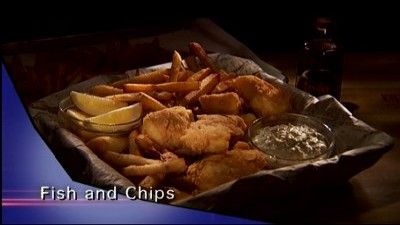
#2 - Fish and Chips at Home
Season 7 - Episode 8 - Aired 2/24/2007
The problem with English-style fish and chips is that you’ve got to hop a plane across the Atlantic to enjoy the dish. We wanted to be able to serve English-style fish and chips—large pieces of moist and delicate cod in a crisp and tender coating with thick-cut fries—at home. Most American restaurants that tackle England’s most popular fast food do so poorly—turning out a greasy mess of fish and potatoes. We aimed to create a home-cook friendly recipe for the real thing: large pieces of moist cod coated in a delicate, crisp batter and chips cut thick and served up crispy, with soft interiors. To start, we’d first need to tackle frying for the home cook. While most restaurants have dedicated frying workstations, deep-frying in a home kitchen is a different matter. Cramped space, spattering oil, and inappropriate equipment all conspire to take the fun out of the job. But it needn’t be an onerous task: With a bit of organization and some basic working knowledge, you’ll be turning out fish and chips that will rival those in England. Along the way, we’d also needed to figure out how to organize the process so that everything made it to the table at once—meaning that both fish and chips are served piping hot. Anything less just wouldn’t be acceptable. Recipes: Fish and Chips Tartar Sauce Tasting Lab: Mayonnaise Equipment Center: Candy Thermometers—Update High-End Deep Fryers
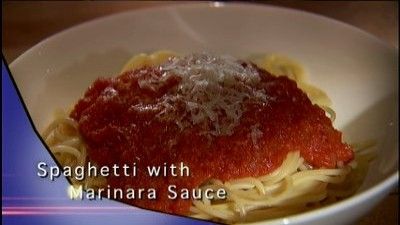
#3 - Even More Italian Classics
Season 7 - Episode 14 - Aired 4/7/2007
Just when we think we’ve become familiar with every Italian dish under the sun, we’re pleasantly surprised to come across a dish we’d somehow overlooked. Join us as we resurrect one Italian classic and streamline another. Take chicken francese. It’s true that this Italian-style chicken cutlet dish isn’t as well known as chicken parmigiana or chicken Marsala, but it’s no less delicious. Coated with a thin eggy crust, the cutlets are served in a light, lemony white wine sauce. With just a few simple elements, it’s hard to believe that such dish can go wrong, but versions we tried proved otherwise. In some recipes, the egg crust was unappetizingly thick and tough, or turned soggy once coated with the sauce. The sauces we tried weren’t much better. While we couldn’t detect lemon in some, others made us pucker, or the wine was too overpowering, giving the sauce an unpleasant boozy flavor. We aimed to conquer these issues and turn out a lemony cutlet dish that we’d want to incorporate into our Italian classics repertoire to make again and again. Another Italian classic, the rich tomato sauce marinara, is not a new discovery, but it’s one worth a second look in terms of simplifying. The hallmark of this sauce is a depth of flavor achieved by hours of cooking, but what if we didn’t have all day? After all, for the modern cook, an all-day marinara, just isn’t a reasonable option. We set out to create an authentic marinara with complex flavors without the hours of work involved. Recipes: Chicken Francese Chicken Francese with Tomato and Tarragon Marinara Sauce Tasting Lab: Sleuthing Canned Whole Tomatoes Equipment Center: Hand (Immersion) Blenders—Updated
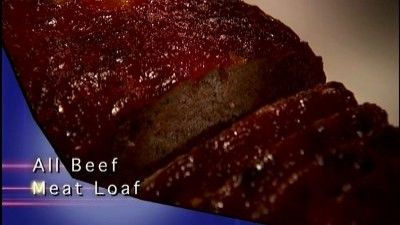
#4 - Meatloaf Dinner
Season 7 - Episode 1 - Aired 1/6/2007
Meat loaf is as synonymous with good old-fashioned American cooking as apple pie. While some may prefer meat loaf made with meat loaf mix, a combination of beef, pork, and veal, there’s something to be said for an all-beef loaf. An all-beef loaf can have terrific meaty flavor and it’s convenient to boot, especially when you can’t find meat loaf mix, or just don’t want to fuss with buying three kinds of meat. However, a meat loaf made with all beef does require some special handling so that it doesn’t taste like a dry, loaf-shaped hamburger. We set out to make a loaf with well-seasoned meat and just enough binder to give the loaf a tender, not tough, texture. In choosing a side dish to partner with our meat loaf, we turned to another old-fashioned dish—skillet-roasted potatoes. Skillet-roasted potatoes are cooked on the stovetop, thus allowing the cook to free up the oven for the main course. We wanted potatoes that are creamy on the inside and crusty on the outside. Some skillet-roasted potatoes can be soggy and greasy—a pitfall we’d need to avoid in developing our recipe. Recipes: Glazed Meat Loaf or All Beef Meatloaf Skillet-Roasted Potatoes Skillet-Roasted Potatoes with Garlic and Rosemary Skillet-Roasted Potatoes with Lemon and Chives Spicy Skillet-Roasted Potatoes with Chili and Cumin Tasting Lab: Ground Beef Equipment Center: The Tong Show—Kitchen Tongs Science Desk: How Gelatin Mimics Veal
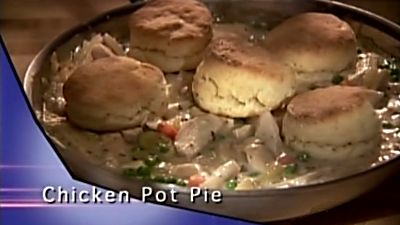
#5 - Faster Family Favorites
Season 7 - Episode 6 - Aired 2/10/2007
With these quick recipes, you’ll be able to get dinner on the table in a reasonable amount of time—and they’ll taste good too. In theory, quick recipes sounds terrific—but we’ve found most streamlined recipes end up sacrificing flavor for speed and convenience. Take chicken pot pie. Most recipes for quick chicken pot pie are a far cry from the classic comfort food. The filling is not much more than leftover chicken stirred into canned cream of chicken soup and a paltry amount of vegetables—sometimes even canned. These versions are far from the comforting dinner that’s always been a family favorite. We aimed to do better. We wanted a really flavorful chicken stew topped with a biscuit crust, and, yes, we wanted it fast. Tamale pie, an already quick dish, has fallen victim to the dump-and-bake approach: combine a can of chili and a can of creamed corn; top with cornbread mix and bake. Tossing cans aside, we set out to make a fresh-tasting, quick tamale pie with a juicy, spicy mixture of meat and vegetables with a quick, homemade cornbread topping. Recipes: Skillet Chicken Pot Pie with Biscuit Topping Skillet Tamale Pie Tasting Lab: Bottled Italian Dressing
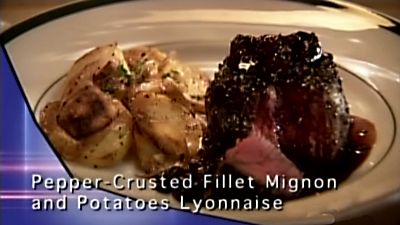
#6 - Meat and Potatoes for Company
Season 7 - Episode 10 - Aired 3/10/2007
We found a unique way to tame the bite on our pepper-crusted filet mignon. Few main courses are as impressive as filet mignon, but such cachet comes with a hefty price tag. The hallmark of this luxury cut is its buttery, tender texture, but some argue that the beefy flavor is too mild, lacking the oomph of fattier (albeit chewier) cuts like the rib eye. So we aimed to boost the meat’s flavor with a lively peppercorn crust and a rich pan sauce. Peppercorn crusts, however, have their issues. They can be overwhelmingly spicy, masking, rather than enhancing, the flavor of the meat. We’d need to strike just the right balance. Getting the crust to evenly adhere to the meat would be a challenge too. In looking for a potato dish to serve alongside our steak, we quickly settled on the simple, but elegant, potatoes Lyonnaise—sautéed slices of buttery potato sweetened with caramelized strands of onion. But getting this dish just right can be a challenge. Buttery potatoes can easily turn greasy. And caramelizing the onion alongside the potatoes is difficult to do without steaming them. We’d need to find a way to get these two ingredients in sync. When you’re aiming to impress and willing to splurge a bit, you can be confident that these dishes will deliver. Recipes: Pepper-Crusted Filet Mignon Port Cherry Reduction Sauce Blue Cheese Chive Butter Potatoes Lyonnaise Tasting Lab: Filet Mignon Equipment Center: Cocktail Shakers Science Desk: Taming Peppercorn Heat
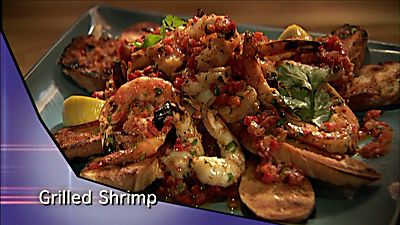
#7 - Summer Cooking
Season 7 - Episode 17 - Aired 4/28/2007
We tackle the best way to grill delicate shrimp as well as chicken destined to be served cold for a picnic. Grilling imparts a smoky dimension to foods that is just about impossible to replicate indoors. So it’s no wonder that once the weather turns warm, we’re eager to get our favorites foods like steaks and burgers onto the grill. But delicate foods, such as shrimp, are trickier to cook over the grill’s intense, dry heat. We wanted to find the best way to grill shrimp so that it’s tender, moist, and flavorful, not dry and rubbery. And we wanted to do so without grilling shrimp in their shells. It’s true that the shells act as a protective barrier, but peeling shells at the table is cumbersome and messy, not to mention that with the discarded shells, the flavorful spice rub is also lost. Warm weather isn’t always about cooking outdoors—it’s about eating outdoors too. Cold barbecued chicken is a classic whether you’re planning a picnic or packing for a road trip. But once chilled, the meat can become very dry and the skin, once thin and crisp, can turn tough and flabby. We wanted to solve these problems and turn out moist chicken with spicy flavor and to boot, we wanted to make it easier to eat, so we didn’t have to use a knife and fork or rely on a wad of napkins to wipe our hands of sticky barbecue sauce. Recipes: Charcoal-Grilled Shrimp Skewers Gas-Grilled Shrimp Skewers Spicy Lemon-Garlic Sauce for Shrimp Skewers Fresh Tomato Sauce with Feta and Olives for Grilled Shrimp Skewers Charmoula Sauce for Shrimp Skewers Spice-Rubbed Picnic Chicken Broiled Shrimp Skewers Tasting Lab: Supermarket Veggie Burgers Lemonade—Updated Equipment Center: Skewers Science Desk: Salting: Better Than Brining?
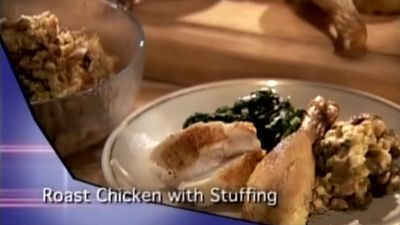
#8 - Sunday Roast Chicken and Stuffing
Season 7 - Episode 4 - Aired 1/27/2007
We wanted a streamlined version of roast chicken with plenty of stuffing to go around—and to solve the problem of cooking the stuffing to a safe temperature without drying out the delicate breast meat of the chicken. The idea of roast chicken and stuffing is very appealing—moist, well-seasoned meat and plenty of flavorful stuffing to satisfy everyone at the table. But in reality, a chicken, even one upwards of 5 pounds (serving 4 to 6 people), doesn’t contain a cavity large enough to accommodate the amount of stuffing you’d need to serve everyone at the table. Sure, you can bake the stuffing separately in a baking dish, but you miss out on all the flavorful juices imparted from the chicken. Our aim, therefore, would be to develop a recipe for roast chicken and stuffing where we could somehow still mimic the flavorful benefits of cooking the stuffing inside the bird. A quick sauté of spinach, especially one with garlic and lemon, goes well alongside roast chicken (in addition to many other dishes). But this simple approach can often go wrong—overcooked spinach, burnt garlic, too much oil—the list goes on. We would focus on avoiding these pitfalls to turn out a tasty side dish you can rely on again and again. Recipes: Stuffed Roast Butterflied Chicken Mushroom-Leek Bread Stuffing with Herbs Currant-Pecan Bread Stuffing with Shallots and Herbs Couscous Stuffing with Fennel, Dried Apricots, and Cashews Sauteed Garlic-Lemon Spinach Equipment Center: Kitchen Shears—Update

#9 - Chicken Kiev
Season 7 - Episode 9 - Aired 3/3/2007
The hallmark of great chicken Kiev is the rich butter filling that melts into a sauce inside the chicken bundles and contrasts perfectly with the crisp bread crumb crust. Popularized during the heyday of Manhattan’s now-shuttered Russian Tea Room, chicken Kiev became one of the restaurant’s premier offerings in the 1960s. The well-heeled were quite familiar with this elegant dish of pounded, breaded, and fried chicken breast stuffed with an herb butter that melted into a sauce. Although chicken Kiev’s Ukrainian roots remain unclear, its current fate is hardly in dispute: It has become a greasy bundle of poultry with a sandy, disconcertingly peelable exterior and a greasy, leaky center. Commonly found in banquet halls and at catered events, this once highbrow dish has become a self-parody. But after preparing several cookbook versions, we realized that pairing a crisp-fried coating with a delicately flavored butter sauce was a great idea that deserved a revival. A dish as special as chicken Kiev deserves a side dish with equal dazzle. We settled on broccoli and turned to pan-roasting, because it works well with many vegetables, imparting a toasty, caramelized flavor. Broccoli, however, can be fussy because the hardy stalks and delicate florets require different handling. We’d need to find a way to get around those issues. Recipes: Chicken Kiev Pan-Roasted Broccoli Pan-Roasted Broccoli with Lemon Browned Butter Pan-Roasted Broccoli with Spicy Southeast Asian Flavors Pan-Roasted Broccoli with Creamy Gruyêre Sauce Tasting Lab: Sandwich Bread Equipment Center: Cookbook Holders
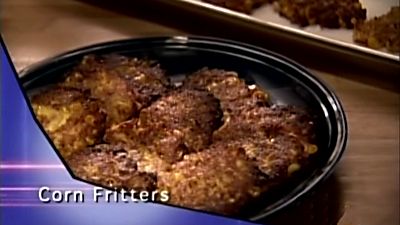
#10 - Barbecued Brisket and Corn Fritters
Season 7 - Episode 18 - Aired 5/5/2007
When you’re looking for a main course to serve a summertime crowd, or want to give a new twist to a summertime vegetable, we hope you’ll turn to these recipes. Summertime entertaining can often mean preparing food for groups larger than 6 to 8—school graduations, Fourth of July, the neighborhood block party—the list goes on. For those times, hamburgers just aren’t practical—unless the cook plans on standing at the grill until everyone is fed. Instead, think brisket. This hefty piece of meat (a full cut can weigh 13 pounds) turns smoky and tender on the grill and leftovers, if there are any, are terrific. Best of all, brisket doesn’t require constant attention, so the cook can enjoy the party too. Brisket isn’t without its challenges, however. On the grill, the meat can take about 12 hours to become fully tender. We wanted to find not only the best way to barbecue brisket, but a way do so more quickly. Summertime also calls for corn. And while we love corn on the cob, we also enjoy other preparations. Take corn fritters. These savory cakes are pan-fried and served hot. They make a terrific side dish or hors d’oeuvres, served as is, or sprinkled with hot sauce. Some recipes are short on corn flavor, but we wanted a recipe that brings the corn front and center. Recipes: Barbecued Beef Brisket For a Charcoal Grill Barbecued Beef Brisket for a Gas Grill Spicy Chili Rub Farmstand Corn Fritters Corn Fritters with Cheddar and Chives Out-Of-Season Corn Fritters Tasting Lab: Hot Sauces Equipment Center: Charcoal Grills—Update
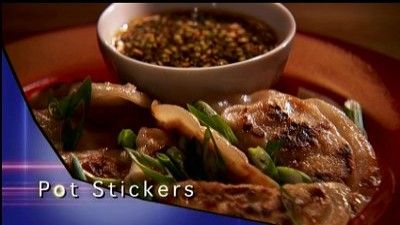
#11 - Not Your Average Stir-Fry
Season 7 - Episode 12 - Aired 3/24/2007
We wanted a complex dish with carefully balanced flavors—without an extensive list of hard-to-find ingredients and hours in the kitchen. Thai-style stir-fries are a refreshing alternative to Chinese stir-fries. Spicy, sweet, sour, and salty, the flavors are well-balanced and complex. But who has the ingredients often required, such as shrimp paste, tamarind pulp, galangal, and palm sugar? And while the more familiar Chinese stir-fry is fairly quick to prepare, a Thai stir-fry can take hours. For our starting point, we looked to a restaurant favorite—Thai chile beef—and set out to streamline this dish without compromising its interesting combination of flavors. Potstickers are another Asian favorite we wanted to enjoy at home. At their best, potstickers are light dumplings filled with a well-seasoned mix of pork and cabbage. Dunked into a soy dipping sauce, they make a terrific start to a meal. Unfortunately, we’ve eaten more than our share of truly awful potstickers—leaden balls of pasty meat in a doughy wrapper. All it took was one bite for us to put our chopsticks down. We wanted to find out the secret to making great potstickers—the right filling, the right wrapper, and a method of assembly that wasn’t overly complicated and didn’t take all day. Most of all we wanted these potstickers to be so good, we’d rather make them ourselves than call for our favorite takeout. Recipes: Stir-Fried Thai-Style Beef with Chiles and Shallots Potstickers Scallion Dipping Sauce Equipment Center: Nonstick Skillets, Update
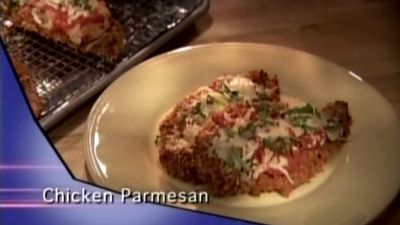
#12 - Lighter Family Favorites
Season 7 - Episode 7 - Aired 2/17/2007
With these lightened recipes, your favorites will be able to appear on the table as often as you crave them. Whether we like to admit it or not, there are some dishes that while tasty, are just too high in fat and calories to be enjoyed on a regular basis. Even a modest portion of these dishes such as macaroni and cheese and chicken Parmesan is prohibitive. But do they need to be? What if we could create lighter versions of these dishes so we could enjoy them more often? In our research we tried dozens of versions of “light” macaroni and cheeses, and again and again we were met with disappointing dishes. Gluey sauces full of tasteless, rubbery nonfat cheeses were the norm. Versions made with ricotta and cottage cheese also showed up. We wanted a creamy macaroni and cheese with real cheesy flavor. Light recipes for chicken Parmesan often fall short too. Again and again we were met with soggy crusts and that culprit, nonfat cheese. We wanted a really crisp crust for our chicken and we wanted great flavor. Recipes: Everyday Lighter Macaroni and Cheese Everyday Lighter Macaroni and Cheese with Ham and Peas Lighter Chicken Parmesan with Simple Tomato Sauce Tasting Lab: Alternative Pastas Whole Wheat Pasta Equipment Center: Indoor Grills
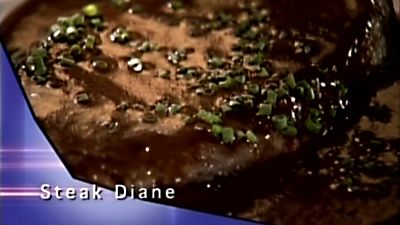
#13 - Flambé at Home
Season 7 - Episode 15 - Aired 4/14/2007
We came up with a foolproof flambé method that doesn't intimidate the home cook. Fifty years ago, steak Diane, pan-seared steak in a rich, peppery pan sauce, was a hot menu item at fancy restaurants. Prepared tableside, it included a burst of pyrotechnics supplied by a match and some cognac. Sure, such theatrics might seem a bit dated and silly, but who can resist having a little fun—especially when entertaining? To give this old-school dish a modern twist, we wanted to find a more reasonable substitute for the laborious veal stock that is the traditional basis for the pan sauce. While we were at it, we wanted to slim down the sauce a bit—yes, we love butter and cream, but many of the recipes we tried were just too rich tasting. And, as for the flambé method, we'd need to come up with a foolproof process that wouldn’t intimidate the home cook. While we were on the flambé bandwagon, it occurred to us we could continue the theme with dessert in the form of crêpes suzette, a stunning dessert consisting of warm tender crêpes served in a bright orange-flavored sauce. But most restaurants that prepare this dish do so for just two. Could we adapt this classic to serve a tableful of hungry guests? We were ready to find out. Recipes: Steak Diane Sauce Base for Steak Diane—Demi-glaze Crepes Suzette Tasting Lab: Veal Stock Beefing Up Beef Broths Orange Liqueurs for Cooking Science Desk: Is Flambé Just For Show?

#14 - Beer Can Chicken Dinner
Season 7 - Episode 19 - Aired 5/12/2007
With our recipes for Beer Can Chicken and Pasta Salad with Pesto, we show you how sometimes the strangest-sounding methods are the most rewarding and how a few easy tricks can give an old standby new lift. Recipes: Grill-Roasted Beer Can Chicken for a Charcoal Grill Grill-Roasted Beer Can Chicken for a Gas Grill Pasta Salad with Pesto Equipment Center: Essential Grilling Gadgets

#15 - Hearty Eggs for Breakfast
Season 7 - Episode 16 - Aired 4/21/2007
With these foolproof recipes, you just might find yourself making time to enjoy eggs a bit more often. Most of us might not have time to prepare (and enjoy) egg dishes during the week, but come the weekend, eggs are a terrific way to begin a leisurely day. In this chapter, we wanted to take a look at a couple of our favorite egg dishes—scrambled eggs and omelets—and see how we could make the most of them. Sometimes you want something heartier than simple scrambled eggs. But adding meats, cheeses, and vegetables weighs down the eggs’ fluffy texture and, worse, turns the eggs watery. We wanted to solve these problems and turn out scrambled eggs that could stand up to the addition of hearty ingredients. And we also wanted an interesting mix of additions, so maybe we’d be inclined to make these eggs for dinner too. Omelets made for one or two aren’t difficult to prepare. But what if you’re making omelets for the whole family? You don’t want to be standing at the stove playing the part of short-order cook, right? We wanted to create one big omelet, big enough to serve 4. Working with such a large omelet wouldn’t be easy—we’d need to figure out how to cook through such a large omelet without it drying out, how to add the fillings (and heat them through), and how to turn the omelet out of the pan without it breaking apart. Recipes: Scrambled Eggs with Bacon, Onion, and Pepper Jack Cheese Scrambled Eggs with Sausage, Sweet Peppers, and Cheddar Scrambled Eggs with Asparagus, Prosciutto, and Parmesan Eggs in a Hole Family-Sized Cheese Omelet Family-Sized Tomato, Bacon, and Garlic Omelet Tasting Lab: Is Fresh Breakfast Sausage Best? Equipment Center: Plastic Nonstick Spatulas Science Desk: How Scrambled Eggs Work
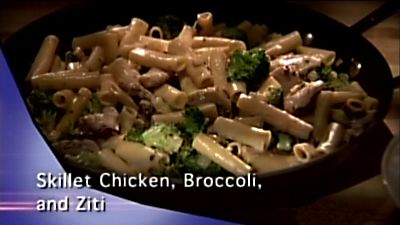
#16 - Streamlined Chicken Skillet Suppers
Season 7 - Episode 2 - Aired 1/13/2007
Dinners prepared entirely in one skillet are perfect for weeknight cooking. Less cleanup is one obvious benefit. A skillet also gives the cook a bit more control over cooking multiple elements. In the oven, dishes such as chicken and rice—ingredients with disparate cooking times—can cook unevenly, so that when the dish comes out of the oven, you end up with mixed results, such as tender rice and dry chicken—or conversely, crunchy rice and moist chicken. A skillet gives you the freedom to move items in and out of the skillet accordingly so that everything comes out perfectly cooked. We have also discovered that a skillet comes in handy in some pasta dishes. Take the restaurant favorite, chicken, broccoli, and ziti. Typically, the pasta is boiled in one pot and then one or sometimes two more pans are required to cook the chicken, broccoli, and sauce. We condensed all the elements into a skillet—even the pasta—which cooks right in the sauce, soaking up maximum flavor for an exemplary version of this favorite dish. Recipes: Skillet Chicken and Rice with Peas and Scallions Skillet Chicken with Broccoli, Ziti, and Asiago Cheese Tasting Lab: White Wines for Cooking Equipment Center: Inexpensive Knife Sets
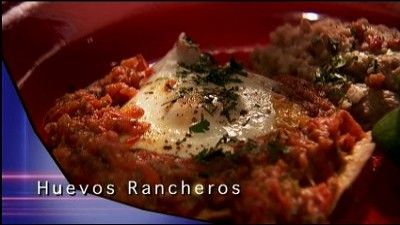
#17 - More Tex-Mex Favorites
Season 7 - Episode 13 - Aired 3/31/2007
We love good Tex-Mex, but depending on which part of the country you live in, chances are you’d be better off preparing it yourself at home. We wanted to take a look at two Tex-Mex favorites, chicken fajitas and huevos rancheros, and create authentic, tasty versions we could stand behind. Chicken fajitas aren’t as easy a proposition as beef fajitas. Beef, by nature, packs a lot more flavor, while chicken fajitas seem to rely on a host of condiments to mask its lack of flavor, or worse, its dry texture. We wanted tender, juicy chicken, and we wanted it well seasoned. We wanted the same for our vegetables—too many vegetables in fajitas are treated as a bland afterthought. As for the tortillas, we wanted warm, soft tortillas, not the brittle tortillas we’ve often encountered in restaurants due to poor heating methods. Huevos rancheros are the answer to a hungry man’s (or woman’s) breakfast. But too often we’ve stared at what looks like a dish of fried eggs crossed with nachos. First, we wanted to get rid of all the unnecessary entrapments, paring back this breakfast classic to its tasty essentials. We’d need to focus on the fiery roasted salsa that typically is part of this dish, but making salsa with out-of-season tomatoes is a gamble. And without access to fresh corn tortillas, we needed to find a way to turn rubbery supermarket corn tortillas into a crisp, not greasy, base for our eggs. Last, we needed to figure out how to coordinate cooking the eggs with the other elements, so that everything comes together simultaneously—hot and fresh. Recipes: Chicken Fajitas for Charcoal Grill Chicken Fajitas for Gas Grill Chicken Fajitas Indoors Chunky Guacamole Huevos Rancheros Refried Beans Tasting Lab: Supermarket Refried Beans Equipment Center: Do Grill Pans Really Grill?
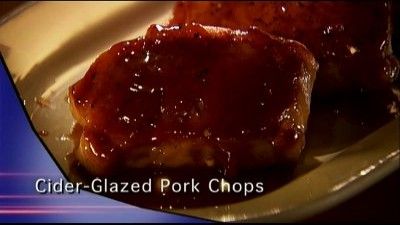
#18 - Two Ways with Pork
Season 7 - Episode 5 - Aired 2/3/2007
New dinner options abound with recipes for pork medallions and glazed pork chops. Recipes: Glazed Pork Chops (Asian & German), Thick-Cut Pork Tenderloin Medallions, Maple-Mustard Sauce, Hoisin-Sesame Sauce for Pork, Apple Cider Sauce Tasting: The Cider Vinegar Rules Equipment: Should You Buy a Bargain Saute Pan?

#19 - Dark Chocolate Desserts
Season 7 - Episode 22 - Aired 6/2/2007
When you're looking to satisfy a serious chocolate craving, these recipes deliver. No matter the dessert—cookie, pudding, cake, or pie—there’s nothing like the flavor of chocolate to make it truly irresistible. In this chapter, we set out to develop ultimate versions of two favorite chocolate desserts: chocolate mousse and chocolate cupcakes. Rich, frosting-like mousse is utterly delicious—for about two spoonfuls. Yet light and silky versions often lack decent chocolate flavor. Once you start adding more chocolate, texture suffers and becomes heavy. We wanted the best of both worlds—a light and silky texture with big chocolate flavor. Chocolate cupcakes are another treat that suffer from faint chocolate flavor. Ever try a mix? Sure they’re easy, but the flavor often falls short. And most homemade chocolate cupcakes aren’t much better. Some may have good chocolate flavor, but the crumb turns dense and confection-like. We aimed to develop a moist, feathery cupcake infused with chocolate flavor. And for such a homey treat, we didn’t want to spend all day, so these cupcakes would need to be almost as easy as using a boxed mix. Recipes: Dark Chocolate Mousse Chocolate-Orange Mousse Chocolate-Raspberry Mousse Premium Dark Chocolate Mousse Dark Chocolate Cupcakes Easy Vanilla Bean Buttercream Easy Chocolate Buttercream Easy Coffee Buttercream Easy Peppermint Buttercream Tasting Lab: Just What Is Dark Chocolate, Anyway? Equipment Center: Muffin Tins, Updated

#20 - Favorite Citrus Desserts
Season 7 - Episode 25 - Aired 6/23/2007
Join us as we infuse one citrus dessert with bright lemony flavor and make another dessert easier than ever to enjoy. Even after the heartiest meal, we find the bracing bite of a citrus dessert welcome. Lemon Bundt cake, glazed with a snowy white icing, is a simple, elegant dessert. But time and again, we are disappointed in its often elusive lemon flavor. Some recipes soak the cake in a sugar syrup flavored with lemon, but we find this makes the cake soggy, ruining its springy fine crumb. We wanted to find a way to infuse Bundt cake with the assertive tang of lemon without marring its texture. Key lime pie is another favorite citrus dessert, but transporting this pie, which has a delicate, wobbly filling, can be difficult. We wanted to find a way to transform this pie into a bar cookie. Not only would a Key lime bar be more portable, it could also be eaten out of hand, making it a far easier dessert to serve—and eat. Recipes: Lemon Bundt Cake Key Lime Bars Triple Citrus Bars Tasting Lab: Are Key Limes Really Key?—Updated Equipment Center: Are Nonstick Baking Sprays Better Than Butter? Science Desk: The 'Magic' of Sweetened Condensed Milk
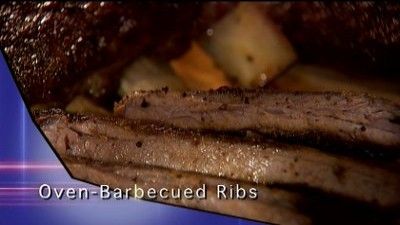
#21 - Rainy Day Barbecue
Season 7 - Episode 20 - Aired 5/19/2007
If you’re a fan of barbecue but never thought it could be replicated indoors, our menu should change your mind. For many of us, it doesn’t seem fair that we can only enjoy barbecue during the short summer months. What about year-round cravings? Take barbecued ribs. If it’s February and a hankering for ribs strikes, does that mean a trip to a local barbecue joint or could we find the answer in our home kitchen? We wanted to develop a recipe for oven-barbecued ribs, so even in the darkest, coldest winter months, we could satisfy our barbecue urges. And these ribs would need to stand up to their outdoor counterparts: tender, fall-off-the-bone meat infused with smoky flavor. Rich, meaty ribs are best enjoyed with a side of tangy coleslaw—specifically buttermilk coleslaw. But while buttermilk provides a trademark tang, it can also make a dressing so thin that it sinks to the bottom of the bowl instead of clinging to the shreds of cabbage. Cabbage poses its own challenges too. We wanted even shreds that were easy to fork and toss with the dressing. And, we wanted crisp cabbage that won’t leach moisture into our dressing, diluting its flavor and turning our coleslaw bland. Recipes: Oven-Barbecued Spareribs Quick Barbecue Sauce Creamy Buttermilk Coleslaw Buttermilk Coleslaw with Green Onions and Cilantro Creamy Buttermilk Coleslaw with Lemon and Herbs Tasting Lab: Is There a New King of Ketchup?

#22 - Strawberry Cream Cake
Season 7 - Episode 21 - Aired 5/26/2007
For our Strawberry Cream Cake, we wanted lots of strawberry flavor, a buttery sturdy cake that could stand up to them, and a lush whipped cream filling that would stay put, so even when cut this cake would be a stunner. Looking for a drop-dead gorgeous summer dessert? Look no further than strawberry cream cake—a snazzier, more presentable version of strawberry shortcake. The components are almost identical—juicy strawberries, sweetened whipped cream, and layer cake (in place of biscuits). The cake, cream, and strawberries are layered, chilled, and served in tall wedges. It’s a terrific way to celebrate summer. We wanted to find the ultimate version of this dessert and solve the problems that often plague it. Because the cake, cream, and strawberries are all layered, cutting this cake can be tricky—the whipped cream can squirt out the sides or the strawberries will ooze out. The strawberries pose other problems too—their juices can soggy a cake that’s too delicate. Some recipes get around this pitfall, by using fewer strawberries, but this results in muted fruit flavor. We wanted those strawberries front and center. Recipes: Strawberry Cream Cake Equipment Center: Mix Masters—Standing Mixers—Updated Science Desk: Heavy Cream versus Whipping Cream

#23 - Old-Fashioned Chocolate Cake
Season 7 - Episode 23 - Aired 6/9/2007
We wanted a towering layer cake of childhood, moist and chocolaty and slathered with thick, billowy frosting. Remember old-fashioned chocolate layer cake—the kind moms everywhere baked? Each towering slice had a tender, airy, open crumb and was frosted with silky-smooth wisps of chocolate heaven. These homespun cakes were tall, sweet, and chocolaty, not dense, dark, and bitter, and they were eaten with an ice-cold glass of milk, not a demitasse of espresso. Admittedly, many of those birthday party chocolate cakes were made with a boxed mix. While those mixes deliver a pleasantly spongy, moist texture and guaranteed height, they were also full of artificial flavors—which as kids, we did not find objectionable. But, as adults with grown-up palates, we wanted real chocolate flavor in our cake. Therefore our goals were two-fold: create an old-fashioned chocolate layer cake with the same moist, tender crumb we so fondly remember and infuse this cake with true chocolate flavor—chocolaty enough to please adults, but not so dense that it might scare away the kids at the table. Recipes: Old-Fashioned Chocolate Layer Cake Tasting Lab: Chocolate Chips Equipment Center: Revolving Cake Stands Science Desk: Enhancing Chocolate Flavor
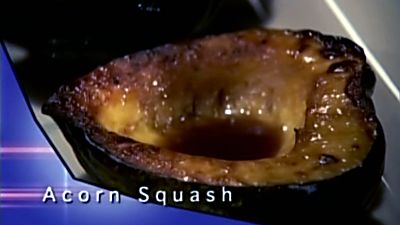
#24 - Best Beef Stew
Season 7 - Episode 3 - Aired 1/20/2007
Join us as we uncover the secrets behind a favorite beef stew and streamline a hearty side dish. A basic beef stew can be altered in dozens of ways, usually by adding more ingredients to the pot. But can you go the other way and strip beef stew down to its bare bones (or, to be more precise, to its beef)? If you trade the carrots and potatoes for a mess of onions and add a good dose of beer (instead of red wine) as part of the braising liquid, you’ve created a simple Belgian beef stew called carbonnade à la flamande. Beef, beer, and onions have a natural affinity—think burger, onion rings, and a beer. In a carbonnade, the heartiness of beef melds with the soft sweetness of sliced onions in a lightly thickened broth that is rich, deep, and satisfying, with the malty flavor of beer. We aimed to create the very best version of this cold-weather favorite. Sweet acorn squash makes a worthy partner alongside carbonnade or with many other dishes during the cold weather season, but too often this squash turns out dry and stringy. We wanted to devise a method that ensured sweet, tender squash, without a lot of hassle. Recipes: Carbonnade a la Flamande—Belgian Beef, Beer, and Onion Stew Acorn Squash with Brown Sugar Acorn Squash with Rosemary-Dried Fig Compote Tasting Lab: Beer for Carbonnade Equipment Center: Paring Knives—Updated Science Desk: Are All Microwaves Created Equal?
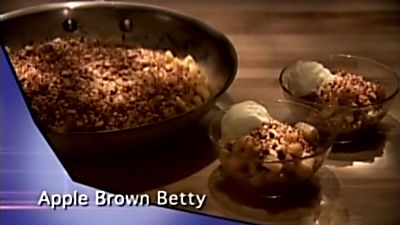
#25 - Easy Apple Desserts
Season 7 - Episode 24 - Aired 6/16/2007
For a not-too-sweet apple dessert, pair a tart apple such as Granny Smith with a sweet apple like Golden Delicious or McIntosh, as we did in Skillet Apple Brown Betty and Easy Apple Strudel. When it comes to apple desserts, apple pie may be the most popular, but it’s also the most involved. When you don’t want to fuss with pie, but you still want that warm and comforting combination of apple and pastry, there are other options. Take apple brown betty—apples, sugar, and buttered bread crumbs. This baked fruit dish is decidedly humble, but delicious nonetheless—especially when served warm with a scoop of vanilla ice cream. But this often-overlooked dessert needs a serious makeover—too many versions are a soggy mess with muddied flavors. Classic apple strudel, a European specialty, consists of lightly sweetened apples, raisins, and nuts wrapped in paper-thin pastry. Traditional recipes involve hours of preparation, rolling and pulling the pastry dough until it is so thin you can read a newspaper through it. We reasoned that there must be an easier (and quicker) way. Determined to find out, we set about streamlining this sophisticated dessert, without compromising its flaky texture and sophisticated flavors. Join us as we resurrect one humble apple dessert and streamline another. Recipes: Skillet Apple Brown Betty Skillet Apple Brown Betty with Golden Raisins and Calvados Skillet Apple Brown Betty with Pecans and Dried Cranberries Easy Apple Strudel Tasting Lab: The Scoop on Vanilla Ice Cream—Updated Equipment Center: Pastry Brushes—Updated Science Desk: Overrun and Ice Cream